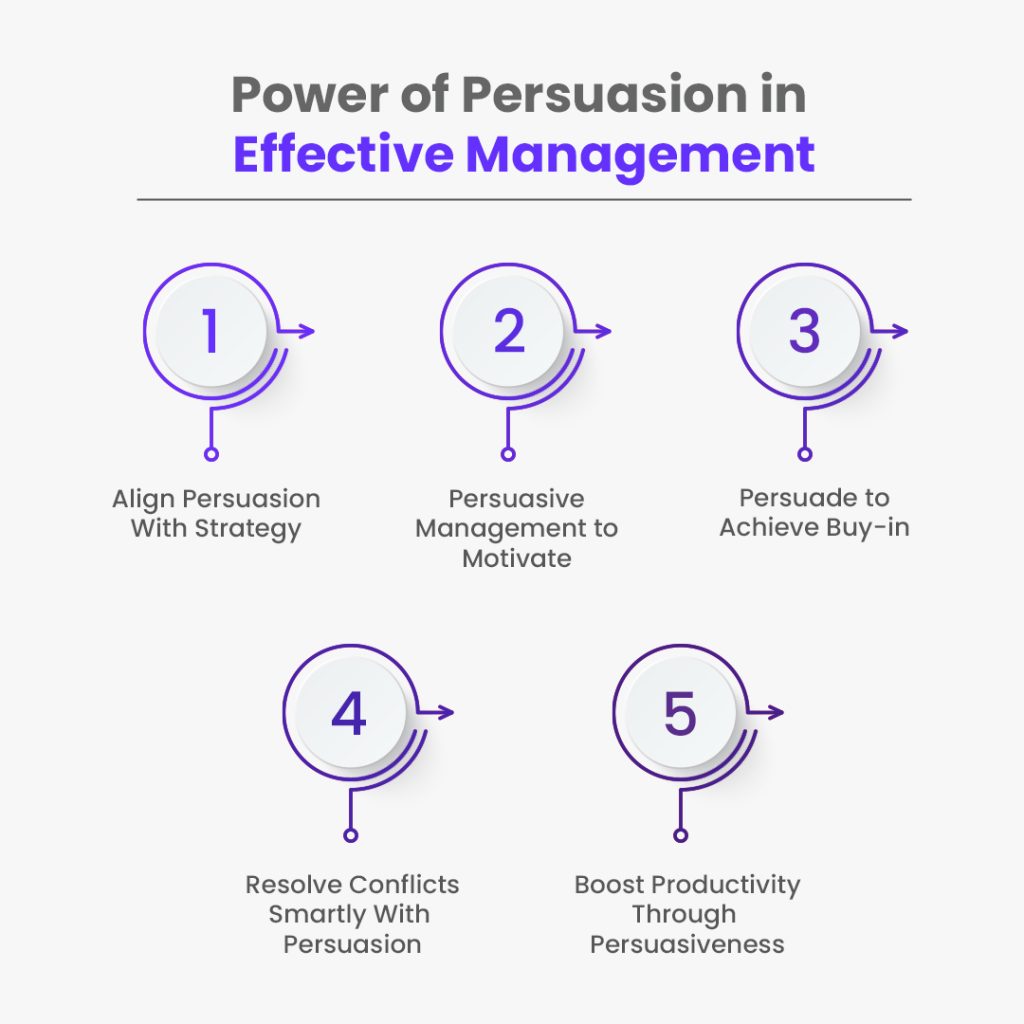
In the dynamic landscape of leadership, achieving collective success is the sole aim of management. It is not uncommon for management to juggle between task completion, conflict resolution and team collaboration all at once.
In the role of a manager, challenges are paramount. Handling all the tasks at hand, besides focusing on achieving desired results, gets tedious if you don’t get your way with people skills. In this blog, I am sharing my insights on why and how to seamlessly incorporate persuasive management into your leadership style.
A crucial aspect of effective leadership, persuasive management relies on strong communication skills. Messages should be persuasive enough to make the tasks of management easy. Persuasion simply implies changing someone’s perception, ideology, or beliefs to something commonly beneficial.
What is Persuasive Management?
Persuasiveness is a demanding skill. A good manager never forces his workforce towards the desired output. They work as a part of their team, making them push themselves for better performance.
Persuasiveness sticks to every aspect of workforce management. It is the ability of leaders to influence, convince, and motivate people to organisational success.
Managers who can persuade employees to find common ground and settle, contribute to a healthier work environment. Mastering the act of persuasion is the key to being a high-performing manager.
Power of Persuasion in Effective Management
As a seasoned senior manager at SBL, I recognise the transformative power of persuasive management in guiding teams toward excellence. Persuasive management can help you motivate your team, easily resolve conflicts, boost team productivity, and much more. Let’s understand these benefits:
1. Align Persuasion With Strategy:
Think of a broad picture and analyse how your efforts contribute to the organisational strategy. When you align the individual goals of employees with those of the company’s objectives, it gets easier to convince diverse team members to commit to one shared vision.

2. Persuasive Management to Motivate
Storytelling is the art of persuasion, even more so when the goal of the company has a strong story supporting such goals. It is never a wrong idea to use the story and company goals to motivate your team. Stories evoke emotions, and emotions drive people.
Show your teams what putting in the work brings to the future of the company. Work always turns out the best when you articulate a compelling vision and persuade your team members to see the value in their contributions. So, carry out tasks with excellence by appealing to the emotions of your team and instilling a shared sense of purpose.
3. Persuade to Achieve Buy-in
Workplace changes are always uncomfortable, even to the most accommodating and adapting people. To shift mindsets and bring the team on board with the changes, you must be adept at navigating through it.
Use your persuasive skills to guide your team members through the transition. Otherwise, restlessness may arise, disrupting routine tasks. You might even lose some of your team members if there is a lack of powerful persuasion.
Appeal to whatever convinces your employees the best, be it logic, interests, aspirations, or emotions. Explain the need for a particular change and also clarify any doubts or fears.
Very often resistance is a result of insecurity among the team members. If addressed properly, you will be able to avoid such resistance to changes.
When managers communicate openly, involve employees in the process of change, and demonstrate a commitment towards employees’ well-being, trust gets strengthened. In the end, it’s managers and team leaders who can urge team members to view changes as an opportunity for the positive transformation.
4. Resolve Conflicts Smartly With Persuasion
Disputes in a work environment are inevitable. When disputes grow bigger, they don’t just affect the members involved but also fill the entire working environment with sourness.
This is why persuasive management skills are essential for conflict resolution. Skilled managers focus on finding mutually beneficial solutions that align with the overall goals of the organisation. This not only stops the disputes from growing more but also helps find a common ground.
Encourage open dialogue, consider diverse viewpoints, and guide the team towards effective solutions. Remember to be neutral and empathetic when listening to either team member. Looking at a situation from both perspectives will help you gather a clear picture of the root cause. The next step will be to find a common ground in order to make both teams collaborate. Well-reasoned compromises keep more disputes at bay.
5. Boost Productivity Through Persuasiveness
Everyday stress and work may make us forget that people working for us are humans at the end of the day. As complicated as a diverse workforce may seem, they are easy to engage towards productivity with growth opportunities and rewards.
Every big and small win of a team member deserves recognition. This makes them feel valued. Feeling appreciated for their efforts further contributes to job satisfaction and a more positive work environment.
Final Thoughts
The ability to persuade and inspire is a cornerstone for achieving collective success. To be a high-performing manager, the performance of the team is absolutely necessary. Harness the power of your team through persuasive management and see the results it brings you. Seek feedback from your peers and adapt your approach to the evolving needs of your team and organisation.
Follow me on LinkedIn
Frequently Asked Questions
1. Why is persuasion important in management?
Organisations constantly evolve, and persuasion helps managers gain the support and commitment of their team members in times of change. In smooth management, persuasion plays a crucial role in convincing employees to embrace change and reduce resistance.
2. What is the purpose of persuasion in the workplace?
Workplace disagreements are resolved through persuasion. Managers who use conflict resolution techniques with persuasiveness facilitate open communication, guiding individuals toward resolution.




Bellenty – ваш надёжный союзник в области конвейерных решений. Для вас стоимость транспортерной ленты на Bellenty.by помогут консультанты интернет-магазина. Благодаря нашему опыту и профессионализму мы гарантируем, что каждая лента, предлагаемая нами, соответствует высочайшим стандартам качества и эффективности. Мы производим индивидуальные решения, учитывая особые потребности наших клиентов. Независимо от величины, состава или технических характеристик, Bellenty обеспечивает идеальное решение для вашего конвейерного оборудования, даря вашему бизнесу надёжность и эффективность.
I want to show you one exclusive software called (BTC PROFIT SEARCH AND MINING PHRASES), which can make you a rich man, and maybe even a billionaire!
This program searches for Bitcoin wallets with a balance, and tries to find a secret phrase for them to get full access to the lost wallet!
Run the program and wait, and in order to increase your chances, install the program on all computers available to you, at work, with your friends, with your relatives, you can also ask your classmates to use the program, so your chances will increase tenfold!
Remember the more computers you use, the higher your chances of getting the treasure!
Thank me by donating if you have the opportunity.
Free Download:
https://t.me/btc_profit_search
Приветствуем вас в мир ставок с БК Лига Ставок! Процесс регистрации и входа в личный кабинет созданы для максимального удобства и безопасности каждого пользователя. Лига ставок личный кабинет вход – легко и быстро, и это открывает доступ к многочисленным возможностям: от ставок на спорт до участия в акциях и получения бонусов.
Начните с нескольких легких шагов для регистрации: заполните обязательные поля формы, подтвердите свою электронную почту и номер телефона, и вы на пути к успеху! После регистрации, используйте ваш новый аккаунт с помощью полученных данных – и весь мир ставок БК Лига Ставок окажется у вас под рукой.
Ваш личный кабинет – это центр управления вашими ставками, где вы можете легко пополнять счет, делать ставки, просматривать историю транзакций, а также получать эксклюзивные предложения и уведомления о предстоящих событиях. Не упустите свой шанс – присоединяйтесь к БК Лига Ставок уже сегодня и начните своё путешествие в мире ставок с комфортом и уверенностью!
Анонсируем выход новой версии мобильного приложения БК Лига Ставок для Android! Этот шаг полностью преобразует ваш пользовательский опыт, делая его более понятным и эффективным. Приложение лига ставок немедленно! В обновлении вы найдете прямой доступ к огромному ассортименту спортивных мероприятий из любой точки с помощью вашего устройства. Улучшенное управление профилем, передовая концепция дизайна для удобной навигации и увеличенная скорость работы приложения – всё это создано для вас. Присоединяйтесь к числу воодушевленных пользователей и получайте удовольствие от ставок где только захотите и в любое время. Установите обновление приложения БК Лига Ставок прямо сейчас и выходите на новый уровень ставок!